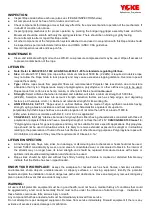
NOTE: This Rope Grab is used as part of a complete personal fall protection system. All other components,
subsystems, and connectors used in conjunction or attached to this Rope Grab should be compatible and meet the
appropriate OSHA / ANSI / CSA requirements for the intended application. Substandard or non-approved components
could compromise the reliability of the system and jeopardize the safety of the user.
CAPACITY AND USE:
Maximum total weight attached to Rope Grab is 310 lbs. Only one user is to be attached to a Rope Grab.
Maximum arrest force capacity is 1800 lbs.
Maximum lanyard length is 3 ft..
A SHOCK ABSORBER MUST BE USED within your Fall Arrest System if you are attached to the Rope Grab by a
lanyard.
INSTALLATION AND USE:
THE ARROWS MUST POINT UP for the Rope Grab to function.
The N-602 Rope grab must be threaded from the bottom of your lifeline.
The life-line should be weighted or tied off at the bottom to assist in the positioning of the Rope Grab.
Use 3-strand 5/8” (16mm) dia. Rope.(See LIFELINE section following).
Depress the ‘Bridge’ of the Rope Grab and move the unit up and down the rope. The unit should lock immediately
and firmly on release.
Test the installation by pulling down on the ring to ensure that the mechanism locks onto the rope.
The anchor point should be capable of supporting a 5000 lb (22.3kN) load and located directly above the user.
Lanyards should be selected to meet the application with a 5000 lb (22.3kN) tensile strength on all components.
ANSI Z359.1- a maximum 3 ft. (0.9m) lanyard.
NOTE: When using a lanyard your fall distance is twice the length of the lanyard + the deployed length of the
shock ab the stretch of the rope + maximum arrest distance of 54 inches (ANSI Z359.1-1992).
Never allow rope or Rope Grab to contact any outside objects during use. Make sure that your possible fall path is
free and clear of obstructions and hazards.
Calculate your fall distance.
Positioning the Rope Grab above user on the life line minimizes falling distance.
Avoid swing falls by working directly below the anchor point whenever possible.
If Rope Grab is subject to an arrest it should be removed from service and discarded.
Continued on other side
.
Yoke Industrial Corp.
N-602 POSITIONING ROPE GRAB—Instructions & Use
Manufactured by:
YOKE Industrial Corp.
#39, 33
rd
Road, Taichung Industrial
Park, Taichung 407, TAIWAN
THESE INSTRUCTIONS FOCUS ON THE CARE AND USE OF THIS ROPE GRAB AND ARE NOT A
SUBSTITUTE FOR A FORMAL CLIMBING AND FALL PROTECTION TRAINING PROGRAM.
Equipment users must be fully trained in and conversant with all regulatory requirements applicable to the workplace in
which the fall protection equipment is to be used. If in doubt contact your local OSHA or CSA office for clarification.
Such training should include information about local circumstances, rules and regulations applicable to the work
situation, a hands-on opportunity to learn how to wear and attach equipment properly, instructions about:
DROP LINE & LIFE LINE: type & selection, strength, stretch, wear, degradation factors, use & maintenance.
HARNESS: type & selection, use & maintenance.
LANYARD, SAFETY SNAPS AND HARDWARE: type & selection, compatibility, use & maintenance.
ANCHOR POINTS: proper techniques and hardware for securing and connecting lanyards, drop lines or lifelines.
PHYSICS OF FALLING: calculating falling distance, hazards, assessing total fall arrest systems.
YOKE N-602 Rope Grabs are 100% inspected for function, construction and material integrity and are designed to
meet the performance requirements of ANSI Z359.1 and OSHA 1926 when used with Polysteel, Polyester or Nylon
5/8” (16mm) Rope and installed and maintained properly (see LIFELINES below).


















